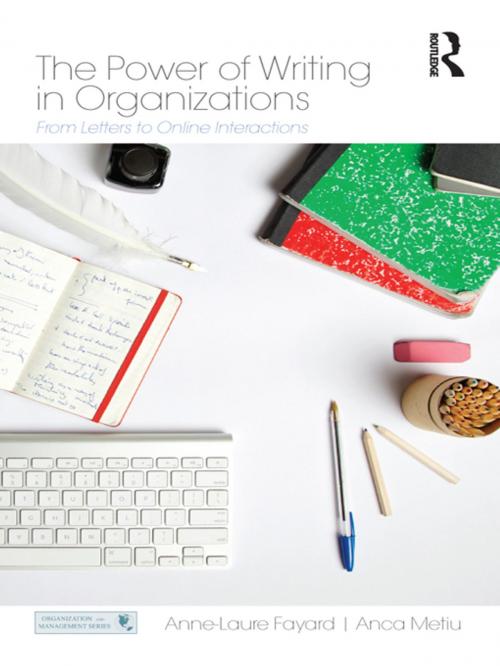The Power of Writing in Organizations
From Letters to Online Interactions
Nonfiction, Reference & Language, Language Arts, Communication, Business & Finance, Human Resources & Personnel Management, Organizational Behavior, Health & Well Being, Psychology| Author: | Anne-Laure Fayard, Anca Metiu | ISBN: | 9781136241505 |
| Publisher: | Taylor and Francis | Publication: | August 21, 2012 |
| Imprint: | Routledge | Language: | English |
| Author: | Anne-Laure Fayard, Anca Metiu |
| ISBN: | 9781136241505 |
| Publisher: | Taylor and Francis |
| Publication: | August 21, 2012 |
| Imprint: | Routledge |
| Language: | English |
This book demonstrates the power of writing in informal and formal organizations in the past and the present. It shows how writing, despite long lasting criticisms that can be traced back to Plato, and in spite of its frequent definition as a mere recording medium is in fact a creative mode of communication that supports the expression of emotions, the developing knowledge, and the building of strong communities among faraway individuals. The first part of the book illustrates how this has been true historically. The focus on writing as a fundamental mode of communication – the other being speech or the oral mode – is still important in our technology-infused world, where writing seems to have been reduced to short cryptic text messages or tweets. Precisely because of their heavy reliance on technology, current practices are in need of a deeper understanding that focus on deep as opposed to surface features and unveil the four essential mechanisms – objectification, reflecting, specifying, and addressing – that give writing its creative powers.
In the second part of the book, we use contemporary case studies and interviews to illustrate how shifting our focus from the media to the mode of communication and focusing on the mechanisms of writing allows us to go beyond current debates about the capabilities of various communication media and to understand better today’s communicative practices. This book is an attempt to unveil the powers of writing as well as to highlight the implications for organizations of the potential loss of these powers in today’s world where writing-based distributed collaborations, interpersonal relationships, and online communities are key sources of innovation and support for individuals and organizations.
This book demonstrates the power of writing in informal and formal organizations in the past and the present. It shows how writing, despite long lasting criticisms that can be traced back to Plato, and in spite of its frequent definition as a mere recording medium is in fact a creative mode of communication that supports the expression of emotions, the developing knowledge, and the building of strong communities among faraway individuals. The first part of the book illustrates how this has been true historically. The focus on writing as a fundamental mode of communication – the other being speech or the oral mode – is still important in our technology-infused world, where writing seems to have been reduced to short cryptic text messages or tweets. Precisely because of their heavy reliance on technology, current practices are in need of a deeper understanding that focus on deep as opposed to surface features and unveil the four essential mechanisms – objectification, reflecting, specifying, and addressing – that give writing its creative powers.
In the second part of the book, we use contemporary case studies and interviews to illustrate how shifting our focus from the media to the mode of communication and focusing on the mechanisms of writing allows us to go beyond current debates about the capabilities of various communication media and to understand better today’s communicative practices. This book is an attempt to unveil the powers of writing as well as to highlight the implications for organizations of the potential loss of these powers in today’s world where writing-based distributed collaborations, interpersonal relationships, and online communities are key sources of innovation and support for individuals and organizations.















